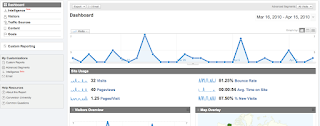My blurbs on Marketing, Business and ...
A marketing students opinions and ideas.
Wednesday, March 16, 2011
Wednesday, February 2, 2011
How I Got People to Follow Me - Strategies All Entrepreneurs Should Know
Getting people to work for free and to follow you with your idea is a difficult task but it is very possible. But, when you are a bootstrapping entrepreneur, funds are very scarce. This is a common problem for all start-ups. However, building a quality team with little or no funds is possible. Here are some suggestions:
1. Paint the Opportunity.
Nothing speaks better than having a compelling story. Having had the opportunity to meet with CEO’s, CFO’s, and Venture Capitalists, I’ve always heard the same advice across the board. Stories are more memorable. When I say “story,” I mean the story of how you came across the problem. All new businesses start with that “a-ha” moment. What lead up to that “a-ha” moment is your story.
When approaching friends or people in your network for recruiting purposes, you better have a compelling story. Choose your words wisely as people will want to be hooked within the first 20 seconds. Paint the idea by use of story. Give them facts about the market, the exact problem that’s going on, and your solution. How do you envision solving this problem?
Because stories touch us, they have the potential to foster empathy with an investor.
2. Be Confident.
Being confident has provided me with a strong backbone when it comes to decision making. As a leader, you must never show weakness. This may be a stretch, but it’s true. Think about it. If your leader breaks down, what do you think that does to the organization? Now, for a young entrepreneur, this is a difficult thing to grasp. But you must make this a priority. There will be times when you honestly don’t know the answer and that is ok. Be confident. Everything you do and say is being followed by your team.
3. Include Everyone in Decision Making.
By creating an open environment where everyone has an equal say fosters growth and promotes positive communication. It creates a sense of trust with your team. Everyone knows that they have a say in decisions and everyone will value that. Some of the best ideas come by way of brainstorming and with brainstorming, you need to be open. Everyone needs to be on the same playing field. I share our financial statements with our developers. I open the floor to comments and ask for opinions when confronted with a difficult decision. I believe it has brought our team closer together as we all have a mutual respect for everyone.
4. Applaud and Praise (More than you normally would).
People like to hear their name. We don’t like to hear about what you have to say, we want you to hear what I have to say. Give praise when praise is warranted, and do this more than you normally would. Praising someone may seem a bit embarrassing but the benefits far outweigh the little bit of embarrassment that you may receive. Also, when praising someone it builds a bond. Try it out sometime, I bet things will start changing.
5. Do Your Part.
When you are a small start-up, you cannot afford to waste time. You cannot afford to outsource any of your work. Take for instance a business plan. Writing a business plan is useless because it’s just that…a plan. Plans change. They continuously change as your company makes its way through its start-up life cycle. When you start approaching people with your idea, people bring up points that you may have never thought of. This changes the business concept which then changes the business plan.
However, the process of writing the plan is invaluable. It makes you think. It makes you research and makes you really focus on what you are trying to accomplish. When you are ready to present to investors, you will be more prepared. Some investors actually require this document and they do it because they want you focused. They understand the importance of the process of writing a business plan.
6. Pay it Forward.
Paying it forward stresses the importance of passing on the things you’ve learned, your connections, your talents, and your knowledge onto those who are willing to accept. It is important to keep the cycle of giving going. When I get the opportunity to meet with an executive, I feel honored but I also feel as if they are paying it forward. You must learn to pay it forward. Give back when you have the opportunity. Provide value for people to learn. This will not only gain credibility for yourself but people will look at you with more integrity. Just don’t take advantage of it. Paying it forward is about being honest and appreciative with all that everyone has given you.
Paying it forward has now given me the opportunity to slowly start sharing what I know with others, like on this blog.
Conclusion
Getting people to work for free and to follow you with your idea is a difficult task but it is very possible. It takes a lot of hard work and determination but people are willing to hop on board with someone who has a compelling story, who gets work done, who has integrity, and who values your opinion.
Tuesday, August 3, 2010
Work at Home Generation: Pros and Cons
Having only worked in the small business area and as an entrepreneur, I am all for this idea. Though, in the midst of starting two companies (all from home) I have realized that one must set concrete boundaries for themselves as well as the loved ones around them.
For you today, I gathered and re-purposed many of the pros and cons I have come across as well as added some personal examples myself.
Pros:
1. Flexibility: Working from home provides the flexibility that some people want and need. Flexibility in terms of when to put the hours in, where to put them in, and how to put them in. One day I can be sitting in my home office working on my business plan but next minute be working in the backyard. I believe I get more accomplished from having the flexibility to change my scenario than being confined to one place. I use dropbox to keep all my files in one central location in which I can access from my laptop or desktop.
2. Creates an organic creative environment: For us right-brained folks, having the leisure to build our space is highly prized. We see this in the cubicle world of many businesses, especially at places like Zappos where creating your own personal space is part of the culture. However, it is still at an office.
3. Dress code: There is no dress code and that saves money. End. Though, some people like the process of dressing up. Being employed by small business since I have had the opportunity to work, I have realized that people who do not dress the part work just as hard or even harder than people who do not.
4. More control: In terms of control, I mean having the ability to set your schedule and deadlines. This requires the type of person who is very disciplined and is goal oriented. If you require a lot of direction, working from home probably isn't good.
Cons:
1. Never leave work: A con for some people but could be a pro for other people. I put this in the con section because, like flexibility and control, they can backfire. To combat this issue, I would suggest setting a place of the house to be solely for business. In my house, my room is my office. But, I am different. And, as flexibility and technology allow me, I am change locations very easily if I am getting distracted.
2. Lack of office camaraderie: We all need to socialize. We all love competition. If you are working from home, the only competition you have is the phone call you are on and the blow dryer.
3. Brainstorming is difficult: It is hard to brainstorm with one person. However, with the advent of WebEx and VoIP, this bit of technology has helped improve the at home brainstorming sessions by having the ability to invite friends to the sessions.
4. Communication issues: family, office: Not being in contact with the office can seem nice but when it comes to keep decision make issues, it can be very difficult. Also, if you do not set strict boundaries for when you work at home, it will be difficult to manage your at home relationships.
Technology is moving to support more work at home businesses. Though there will still be a need to get your competitive fix and be the social butterfly that you are. I am interested in seeing where and how businesses will utilize the many benefits and overcome the negative issues that surround work at home to accomplish something more efficient and effective.
Do you work from home? How do you handle it? What else do you like and dislike?
Tuesday, July 27, 2010
The Tip Network: Bringing the Bank to You

For all who don't know, mainly due to the fact that I personally couldn't say anything until certain milestones were reached, but I have started my own company. One big milestone was making sure we submitted patents and the other was the fact that we placed in the Top 10 of Entrepreneur Magazines Best New College Idea. It's an amazing accomplishment seeing how the magazine is nationwide and there were thousands of entries. Unfortunately, we were not picked to move ahead with the top 5. It was unfortunate but I feel like it gave us a boost that we wouldn't have had before. Now, we have portfolio material.
Speaking of material, for the contest we were asked to submit a three minute video detailing our business and some content. Check out our video and give me your thoughts!
http://www.youtube.com/watch?
Though we did not make it to the next round we are still moving forward. This has made us want to succeed even more. The reasons why we didn't move forward are still up in the air. I have e-mailed them back asking for feedback so when and if I receive any, I will update you all.
Thanks for everyone's support. The other entrants ideas were just as good, so good luck to them.
Thursday, June 24, 2010
The shower is such a niche.

Isn't it funny how random ideas and thoughts occur when you least expect them. As I was showering the other day I became distracted by number of bottles and the colors they attribute to their usage. Not only is a shower a good place to see the evolution of product design but it also a great place to what a niche is.
The shower is a place where things get clean but who would have thought that marketers have dissected the body into hundreds of niches. On the basic level, they have soap for guys and girls. They have soap bars and then body wash. They have conditioner and shampoo. They have a combination conditioner and shampoo. It's amazing to see just how dissected the body can be.
The next time you take a shower, take a close look at all the products in there. What are they for? How are they different from another bottle? Could one bottle satisfy other tasks or has the marketer created a unique niche?
Has the "shower industry" taken niches too far? What do you think?
Monday, June 21, 2010
Should I wash my car today?

 Everyone or most everyone who owns a car asks themselves this basic question "Should I wash my car today?" It is such a simple question yet there is so much to consider. The weather. Your time. Your laziness. The weather. It all boils down to whether the weather will hold up long enough for your time to be worth washing your car today. I mean, I would hate to wash my car only to wake up the next day and it's raining. What a waste!
Everyone or most everyone who owns a car asks themselves this basic question "Should I wash my car today?" It is such a simple question yet there is so much to consider. The weather. Your time. Your laziness. The weather. It all boils down to whether the weather will hold up long enough for your time to be worth washing your car today. I mean, I would hate to wash my car only to wake up the next day and it's raining. What a waste!Washing your car is one of those rituals and spiritual moments where we become one with our car. It's like the car knows that it's getting clean and somehow we think it runs better after a nice clean, which usually takes between 2-4 hours. Not sure where the time goes but when you get back in it the next day it's a feeling of accomplishment. A feeling of a freshly washed car, vacuumed interior and you even found some febreeze and used it on your seats. Ahhhh, what a lovely feeling.
But it all boils down to the basic question "Should I even wash my car today?"
The answer is YES. Or, it could be NO. Fear no longer and stop crying. We have developed a solution. The iShould Car Wash App.
A couple months ago I found myself asking the same question and it struck me. I then formed the iShould App Project to help answer the car wash question but it actually applies to many other questions. Should I surf? Should I Hike? Should I Divorce? Well, not the last one. But the underlying concept (patents pending) let's take all this free data, weather in particular and make some use out of it. So that is what we set out to do.
So, be on the look out in your nearest app store for the iShould App Project. Our first app will be: iShould Car Wash. We will be launching on the android market by summers end and then move to iPhone and Blackberry. After we release the initial app, we will be following up with additional apps which are in the queue.
Have any mobile app ideas that you think are cool? Don't have the resources? E-mail me and we can talk.
Friday, April 16, 2010
Top 3 Common Internet Marketing Tools

Overview:
Internet marketing tools can be categorized in 3 areas
1. Assessment Tools
2. Promotional Tools
3. Metric or Analytical Tools
This is the time to be in social and Internet marketing. With only 9% of business' using some form of social media (Entrepreneur Magazine April 2010), the opportunity to help business' understand and profit from making a presence is huge.
The actual 'doing' part of social media comes natural to my generation. What I mean by doing is, forming meaningful relationships and utilizing existing Internet tools. These process' have been ingrained in our generation from early on. The trouble I see, not only for myself but also for others who didn't grow up in this technological era, is where to start. This is a common problem and I would like to start by addressing the 3 common Internet marketing tools used in social and Internet marketing: Assessment Tools, Promotional Tools and Metric or Analytical Tools.
Assessment Tools
Assessment tools look at how things are built. They analyze your sites content, meta data, heading and image tags, Interior page analysis, inbound links, promotional tools such as twitter links and much more. Assessment tools, such as Hub Spots website grader can search all these variables as well as compare your site against a competitors. Assessment tools beg the question "How can we make this better and more visible?"
Promotional Tools
Tools that get the word out and boost visibility of your website are categorized as promotional tools. Sites such as stumbleupon.com, digg.com and technorati.com are some of the major players and sites that are must for website owners to submit their site too. Promotional tools beg the question "How can we tell more people about what we are doing?"
Metric or Analytical Tools
There are two widely held theories of the role of marketing and advertising. One side suggests that advertising/marketing must tie directly into sales. The other replies that advertising/marketing need not show a direct relationship because subjective variables such as awareness, brand equity and attitudes cannot be measured. I believe in the latter. However, when trying to convince your boss of the benefits of social media and Internet marketing, she/he may not fully agree and may ask for the ROI or return on investment. This is where metric tools have helped entrepreneurs and employees looking for growth prove these paths are worth the investment.
Metric and analytical tools are good for identifying trends. Such trends could consist of movement of a user throughout your site, landing page behavior and sales funnel behavior. These tools are widely available. For my site, I use Google Analytics. Since Google has over 61% of the market share, I believe it is wiser to be in the market where people are at. Metric tools ask the question, "Are things, in general, doing better or worse?"
Assessment, promotional and metric tools ask the questions, how can we make this better, how can we tell more people about what we are doing and are things doing better overall or worse.
Tuesday, April 6, 2010
Entrepreneurship. Plus update.
What is an idea actually worth? One article I read said nothing. One said, 1.00. One said, 20.00 but it depends on how good the idea is. I believe it is a combination of all of these. Many of us have great ideas. Brilliant ideas that if we only ran into that one old man at the tavern who had large amounts of cash billowing out of his pockets who would give to us, then ohh boy, we would be in the money. It is much harder than that, though that would be pretty nice.
An idea isn't worth much until you can prove it is attainable and profitable. It takes hard work and networking. It takes determination and passion.
While browsing for my textbooks earlier this semester, I ran into an Entrepreneur textbook and thought to myself, "Is this really a class?" And, it actually is, though many do not know about it. I have started reading some of it and interestingly, the authors try to connect genes with entrepreneurship. They say that, some people are born to be entrepreneurs. Because, in a way, being an entrepreneur is not all about coming up with a great idea. Being an entrepreneur is about recognizing opportunities. Most new business' are built from problem recognition. Entrepreneurs are the ones who see the problem, evaluate an alternative and exploit that opportunity. The authors go on to say that lifestyles also affect future entrepreneurs.
It is not just the idea that will get you there, it's also the execution.
Thursday, March 25, 2010
My Journey Through Patent Land
He was determined to get heard so he drove to their headquarters multiple times and waited in their lobby. Long story short, he was finally heard, they picked up his idea and he ran with it.
This will be my first attempt to build that same type of environment, that same suspense he created, all through the internet. So here are a couple updates regarding my patent expedition:
October 2009 - Pitched preliminary idea to our Director of Entrepreneurship at San Diego State University. Intrigued by the idea, he pointed me into the direction of protecting my "process" and so I moved with it. Now, it was a good direction to be pointed in, but it is very overwhelming. I attempted to research through the USPTO website and couldn't find exactly what I dreampt of, that was good news.
February 2010 - Was introduced to my friends husband who is involved in the banking industry. Had a couple meetings with him and started mapping out details on just how this process would function. Without his knowledge, I probably would have given up since it is somewhat complex. Though, just because it is complex and would require a large investment, that is not distracting me. The returns on investment are big enough to not even worry about the initial investment.
March 2010 - Pitched my more detailed idea/plan to the Director of Entrepreneurship again and he loved it.
And that is where I stand now. Waiting.
Feel free to e-mail me any questions, comments or support. Thanks!
Monday, March 15, 2010
NEW!!!
 So FRESH and so NEW.
So FRESH and so NEW.What do you think? My call to action is (1) comment, re-tweet, engage (2) do something NEW!
